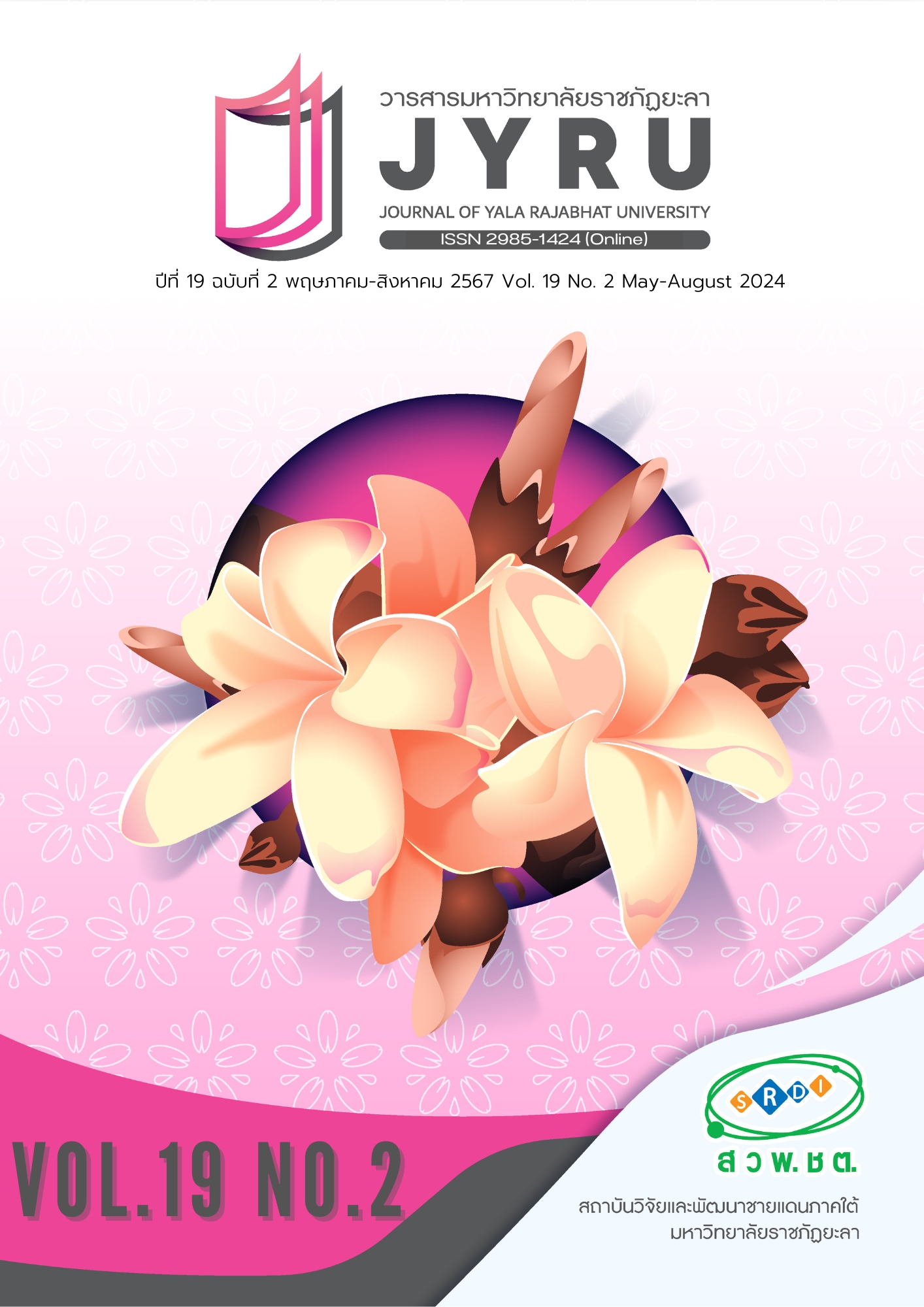การสื่อสารการตลาดเชิงบูรณาการอิสลามสำหรับธุรกิจมุสลิมในจังหวัดชายแดนใต้
Main Article Content
บทคัดย่อ
การสื่อสารการตลาดเป็นหนึ่งในกลยุทธ์ทางการตลาดที่ช่วยสร้างรายได้ให้แก่ธุรกิจ ไม่ว่าจะเป็นธุรกิจขนาดย่อม กลาง และใหญ่ รวมถึงธุรกิจในจังหวัดชายแดนใต้ของประเทศไทย ซึ่งประชากรส่วนใหญ่เป็นมุสลิม จึงเป็นประเด็นที่น่าสนใจว่านักธุรกิจมุสลิมและลูกค้ามุสลิมทราบหรือไม่ว่าการสื่อสารการตลาดตามบทบัญญัติของศาสนาอิสลามควรเป็นอย่างไร หากธุรกิจดำเนินการสื่อสารการตลาดเชิงบูรณาการอิสลามแล้วจะส่งผลอย่างไรกับธุรกิจ บทความนี้จึงมีวัตถุประสงค์เพื่อนำเสนอแนวทางการสื่อสารการตลาดตามบทบัญญัติอิสลามที่เหมาะสมกับนักธุรกิจมุสลิมในจังหวัดชายแดนใต้ การศึกษานี้ใช้แบบวิเคราะห์เอกสารจากบทความวิชาการที่เกี่ยวข้อง การวิเคราะห์เนื้อหา และนำเสนอผลแบบพรรณนาวิเคราะห์ ผลการศึกษาพบว่า การสื่อสารการตลาดโดยการโฆษณาต้องนำเสนอข้อเท็จจริง ไม่โกหก บิดเบือนข้อเท็จจริงจนลูกค้าเกิดความเข้าใจผิด การผลิตงานโฆษณาต้องไม่มีสิ่งต้องห้าม เช่น ซินา สุรา และดนตรี ส่วนการประชาสัมพันธ์ต้องมุ่งเชิญชวนให้เกิดสิ่งที่ดี และห้ามปรามสิ่งไม่ถูกต้อง สำหรับการส่งเสริมการขายต้องไม่เข้าข่ายการพนัน ล็อตเตอรี่ และหวย การใช้พนักงานขายต้องไม่ให้ข้อมูลเท็จ ไม่ตอบคำถามลูกค้าด้วยความไม่รู้ และไม่ว่าร้ายคู่แข่งขันทางธุรกิจ และการผลิตเนื้อหาการตลาดบนโซเชียลมีเดีย ต้องไม่ทำตามกระแสโดยไม่คำนึงถึงบทบัญญัติของอิสลาม
Article Details

อนุญาตภายใต้เงื่อนไข Creative Commons Attribution-NonCommercial-NoDerivatives 4.0 International License.
บทความ ข้อมูล เนื้อหา รูปภาพ ฯลฯ ที่ได้รับการเผยแพร่ในวารสารมหาวิทยาลัยราชภัฏยะลานี้ ถือเป็นลิขสิทธิ์ของวารสารมหาวิทยาลัยราชภัฏยะลา หากบุคคลหรือหน่วยงานใดต้องการนำทั้งหมดหรือส่วนหนึ่งส่วนใดไปเผยแพร่ต่อหรือกระทำการใดๆ จะต้องได้รับอนุญาตเป็นลายลักษณ์อักษรจากวารสารมหาวิทยาลัยราชภัฏยะลาก่อนเท่านั้น
เอกสารอ้างอิง
Abdullah, S. A. C. & Sahad, M. N. (2016). Integrated marketing communication: a spiritual and an ethical Islamic perspective. Int. J. Islamic Marketing and Branding, 1(4), 305-320.
Ahmad, J. (2014). The role of public relations in promoting Islamic products globally: the Malaysian experience. Journal of Islamic Studies and Culture, 2(3), 63-81.
Bari, A. & Abbas, R. Z. (2011). Advertisement and Islam: a Muslim world perspective. Australian Journal of Business and Management Research, 1(6), 152-157.
Billah, M. M. (2020). Marketing and advertisement the Halal standard. Journal of Islamic Banking and Finance, 37(2), 11-20.
Burki, U. & Maglajlić, S. K. (2013). An Islamic marketing perspective on salesperson’s intentions to behave ethically. Int. J. Social Entrepreneurship and Innovation, 2(5), 391-403.
Chelong, A. & Laeheem, K. (2019). The causes of behavior against Islamic ways among Muslim risk youth in three southern border provinces. Academic Services Journal, Prince of Songkla University, 30(1), 156-166.
Chiarakul, T. (2022). Perspectives of both Muslims and non-Muslims foreign tourists and Thai Halal restaurant entrepreneur towards integrated marketing communication and service quality leading to selection intention of Thai Halal restaurants. Journal of Business Administration and Languages, 10(2), 123-138.
Fadahunsi, A. & Kargwell, S. (2015). Social media, consumer behavior and marketing strategy: implications of “Halal” on Islamic marketing operations. Journal of Small Business and Entrepreneurship Development, 3(1), 36-43.
Insorn, T. (2019). Illegal advertising of supplementary food among Facebook and law enforcement guideline for officer. Research and Development Health System Journal, 12(1), 40-48.
Kirat, M. (2015). The Islamic roots of modern public relations and corporate social responsibility. Int. J. Islamic Marketing and Branding, 1(1), 97-112.
Nopphakhunniran, N., Puwittayathorn, T. & Longprasert, S. (2017). Islamic bank of Thailand Imagin, upper southern region towards the customer’s perceived. Journal of Management Sciences, 4(1), 179-202.
Nuh, R., Hayeemad, M. & Labduang, A. (2022). The effects of management and marketing competencies on business performance of Halal community enterprises (HCE) in three southern border provinces of Thailand with entrepreneurial self-efficacy as the moderator variable. Panyapiwat Journal, 14(1), 42-57.
Rahman, M. K., Mamun, A. A., Khan, A. H. & Jalil, A. (2014). Ethical implications of sales promotion in Malaysia: Islamic perspective. Journal of Business Law and Ethics, 2(1), 13-27.
Rehman, S. U. & Ibrahim, M., S. (2011). Integrated marketing communication and promotion. International Refereed Research Journal, 2(4), 187-191.
Shafiq, A. (2018). A collection of Islamic advertising principles: revisited and detailed. Int. J. Islamic Marketing and Branding, 3(3), 209-222.
Shafiq, A., Haque, A., Abdullah, K. & Jan, M., T. (2017). Beliefs about Islamic advertising: an exploratory study in Malaysia. Journal of Islamic Marketing, 8(3), 409-429.
Sutaputra, C. & Seanyen, T. (2021). Muslim tourists’ behavior & service marketing mix for Halal tourism in Thailand. The Journal of Pacific Institute of Management Science (Humanities and Social Sciences), 7(1), 307-314.
Syafril, S. & Hadziq, M. F. (2021). Islamic principles in marketing: an overview of Islamic marketing mix in social-media campaign. Journal of Islamic Economics, 1(1), 69-82.
Wang, Y. & Ma, Y. (2013). Public relations consultancy potential in the Muslim world: public relations from Islamic perspective. IOSR Journal of Humanities and Social Science, 18(6), 98-105.
YahYa, N. H. & Rasit, R. M. (2019). Muslim consumer rights based on Islamic advertising principles. ISLÓMIYYÓT, 41(1), 83-92.


